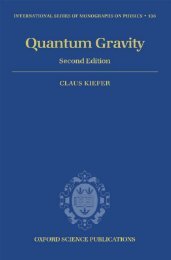The Physical Basis of The Direction of Time (The Frontiers ...
The Physical Basis of The Direction of Time (The Frontiers ...
The Physical Basis of The Direction of Time (The Frontiers ...
You also want an ePaper? Increase the reach of your titles
YUMPU automatically turns print PDFs into web optimized ePapers that Google loves.
Introduction 7<br />
language is loaded with prejudice about the flow <strong>of</strong> time.) <strong>The</strong> fact that there<br />
are documents, such as fossils, only about the past, and that we cannot remember<br />
the future, 3 appears as evidence for this so-called ‘structure <strong>of</strong> time’<br />
or the ‘historical nature’ (Geschichtlichkeit) <strong>of</strong> the world.<br />
However, an asymmetry in the stack <strong>of</strong> movie frames on the desk is defined<br />
regardless <strong>of</strong> any presentation or production <strong>of</strong> the movie in external time.<br />
Correlations between an individual movie frame and certain others, which<br />
may represent ‘documents’ about the latter, are properties <strong>of</strong> the set <strong>of</strong> frames<br />
on the desk. If consistent asymmetric memory relations existed throughout<br />
the whole story, an intrinsic observer, who was part <strong>of</strong> the story, could know<br />
its content only at the (intrinsically defined) ‘end’. He could nonetheless conceive<br />
<strong>of</strong> a ‘potential’ complete story even within the story, in particular if<br />
he discovered dynamical laws. Existing ‘actually’ only in a specific frame, he<br />
could neither deny nor prove the existence <strong>of</strong> other frames, although he might<br />
‘remember’ those frames which represent his intrinsic past (even if the movie<br />
were presented backwards). <strong>The</strong> time he is aware <strong>of</strong> has to be read from clocks<br />
showing up on the picture frames – not from the watch <strong>of</strong> an external movie<br />
viewer or from any frame numbers (see also Chap. 1 and Sect. 5.4). <strong>The</strong> concept<br />
<strong>of</strong> ‘existence’ is here evidently used with various meanings, and the debate<br />
may easily become one about words. Similarly, within our ‘world movie’, concepts<br />
like fixed and open, oractual versus potential, can only be meaningful<br />
either as statements about practical abilities <strong>of</strong> predicting and retrodicting,<br />
or as statements about dynamical models.<br />
<strong>The</strong> argument that the historical nature <strong>of</strong> the world be a prerequisite<br />
(in the Kantian sense) for the fact that we can make experience does not<br />
exclude the possibility (or necessity) <strong>of</strong> explaining it in terms <strong>of</strong> those laws<br />
and concepts that have been distilled from this experience. <strong>The</strong>y may then<br />
be hypothetically extrapolated to form a ‘world model’, whereby the historical<br />
nature may even turn out not to apply to other spacetime regions (see<br />
Sect. 5.3.3).<br />
In classical physics, the Second Law is usually regarded as the physical<br />
basis <strong>of</strong> the historical nature <strong>of</strong> the world. Its statistical interpretation would<br />
then mean that this ‘structure <strong>of</strong> time’ (that is, its apparent direction) is<br />
merely the consequence <strong>of</strong> contingent facts which characterize our specific<br />
world. For example, one may explain thermodynamically why there are observations,<br />
but no ‘un-observations’ in which initially present information (memory<br />
about the future) would disappear by means <strong>of</strong> a controlled interaction<br />
between the observing and observed systems. This un-observation has to be<br />
distinguished from the usual process <strong>of</strong> forgetting, which represents an information<br />
loss in the memory device in accordance with an increase <strong>of</strong> entropy<br />
(see Sect. 3.3).<br />
<strong>The</strong> concept <strong>of</strong> ‘retarded’ information would thus arise as a consequence <strong>of</strong><br />
thermodynamics (and not the other way round, as is sometimes claimed). <strong>The</strong><br />
3 “It’s a bad memory that only works backwards” says the White Queen to Alice.


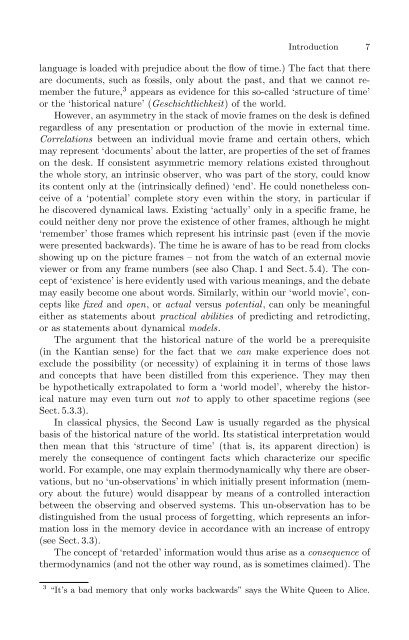
![arXiv:1001.0993v1 [hep-ph] 6 Jan 2010](https://img.yumpu.com/51282177/1/190x245/arxiv10010993v1-hep-ph-6-jan-2010.jpg?quality=85)

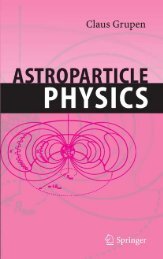
![arXiv:1008.3907v2 [astro-ph.CO] 1 Nov 2011](https://img.yumpu.com/48909562/1/190x245/arxiv10083907v2-astro-phco-1-nov-2011.jpg?quality=85)
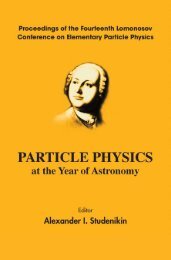
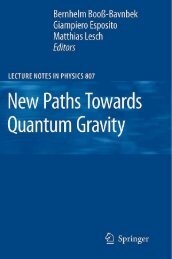
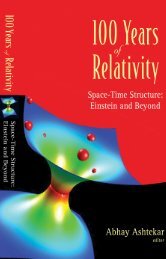
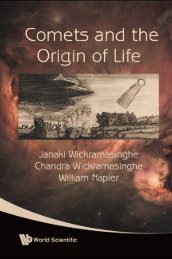
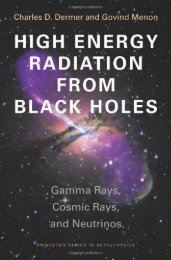
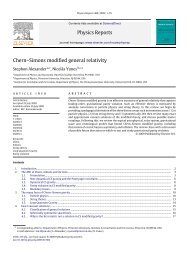
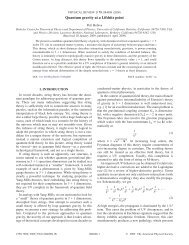
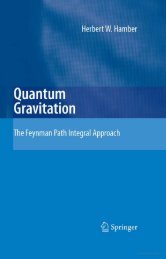
![arXiv:1002.4928v1 [gr-qc] 26 Feb 2010](https://img.yumpu.com/41209516/1/190x245/arxiv10024928v1-gr-qc-26-feb-2010.jpg?quality=85)
![arXiv:1206.2653v1 [astro-ph.CO] 12 Jun 2012](https://img.yumpu.com/39510078/1/190x245/arxiv12062653v1-astro-phco-12-jun-2012.jpg?quality=85)
